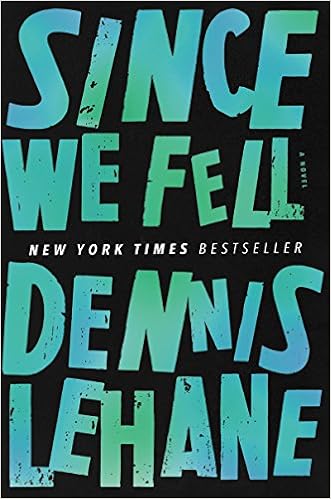The daughter of a domineering psychology
book author, reporter Rachel Childs grows up without knowing who her father is.
Her quest to unmask his identity following her mother’s death leads her to
Brian Delacroix, a Canadian lumber heir moonlighting as a private
investigator. Though Brian’s search proves unsuccessful, this is not the last
time their paths will cross. Later, a traumatic turn of events in Haiti prompts
Rachel to have an on-air breakdown, rendering her jobless, divorced, and a
virtual shut-in. Enter Brian, now active in his family’s business, who helps
her heal. Though he seems at first like a godsend, over time, Rachel becomes
increasingly convinced that Brian is not all that he claims to be. But will
uncovering his secrets come at the cost of her sanity?
Rightly or wrongly, when authors
impress us, when they win our appreciation of their craft, we expect them to
continue to do so. Dennis Lehane’s Kenzie and Gennaro novels deftly blended snarky
narration and urban grit, Mystic River provided
a haunting look at child abuse (and inspired one hell of a film adaptation),
and The Given Day, the author’s first
foray into historical fiction, proved his magnum opus. Since then, Lehane has
achieved more recognition thanks to successful film adaptations of his work,
but his books have entered a slow decline. The long-awaited sixth Kenzie-Gennaro
novel, Moonlight Mile, did not equal
the best of its predecessors and the two follow-ups to The Given Day (Live by Night
and World Gone By) lacked the first
book’s grandeur, offering instead a more personal tale of attempted redemption.
In Since We Fell, Lehane tried to
revitalize his writing by approaching it through a different lens. Rachel is
his first female protagonist and is neither detective nor hoodlum. While this
change of pace is commendable, Since We
Fell still suffers from a series of missteps that the Lehane of twenty
years ago would have known to avoid.
To
his credit, Lehane still has a good ear for dialogue (witness some of Rachel
and Brian’s banter in the last third of the book), and he continues to capture
New England settings with conviction, even when those settings are Provincetown
or swankier Boston rather than blue-collar Dorchester. He also succeeds in
creating suspense through paranoia. Though the book’s overall pacing is
frustratingly inconsistent, when it finds its rhythm, it makes it difficult for
readers to turn away.
That
said, Lehane’s choice of protagonist is a curious one. New for him does not, in
this case, mean unfamiliar. A psychologically scarred, unemployed loner named
Rachel who becomes suspicious of those around her fits The Girl on the Train as much as it does this book, and at times,
the narrative plays like a gender-flipped Gone
Girl. In an effort to complicate her characterization, Lehane also puts off
delving into the roots of Rachel’s guilt until later in the novel and then ham-handedly
wallows in it. His intent – giving a competent and courageous investigative
journalist some inner demons to slay – is commendable, but drowning Rachel in
recrimination makes her eventual recovery that much harder to take. Indeed, the
action-heavy antics of the latter chapters, while breathlessly entertaining,
seem at odds with certain aspects of prior characterization.
Since We Fell also suffers from
maddeningly uneven pacing and plotting. Plenty of books start off slowly before
gaining momentum; few seem like entirely different novels grafted together.
Rachel’s search for her father’s identity, which occupies much of the first few
chapters, has little connection to anything later in the book and feels like
filler once the pace quickens. Lehane’s decisions of where to begin the story,
what to allude to in flashback vs. what to describe in basetime, and what to
emphasize all invite second-guessing.
Flawed
as it is, Since We Fell is not an “Abandon
ship!” call from Lehane to his longtime readers. There are enough turns and
tension to make this book worth a read, and Lehane’s willingness to try
something different is a risk that should be rewarded. On the other hand, those
who are expecting a return to the rare form of Lehane’s earlier career will be disappointed.
7.5/10

No comments:
Post a Comment